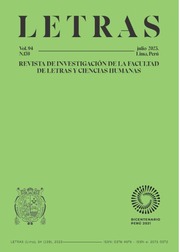Architectures of the Uncertainty: Narrative Structures in the Short Stories “Un sueño realizado” by J.C. Onetti, and “Amor a la distancia” by E. Paz Soldán
Abstract
The first half of the 20th century introduced the idea of the uncertainty in the scientific fields as well as in the art. Knowledge and creation were affected by the centrality assumed by the concept of uncertainty. It is possible to identify a specific literary field concerning uncertainty. Most novels and short stories belonging to the fantastic genre moves on the blurry limits between imagination and reality, that is to say between the condition of verosimilitude and impossibility of the narrative world. The postmodern fictions are structured in the sameway, exploring the blurry limits between fiction and reality according to the metafiction typical features. For this reason, the literature of uncertainty includes fantastic literature as well as postmodern one. In these fields of literature, all kinds of novels and short stories need an internal and low visible narrative structure. In my opinion the comparison between Juan Carlos Onetti’s “Un sueño realizado” and Edmundo Paz Soldán’s “Amor a la distancia” shows two different narrative models. Onetti’s short story, “Un sueño realizado”, could be an example of a static architecture of uncertainty built by assimilation. Otherwise, Paz Soldán’s short story, “Amor ala distancia”, could reveal a dynamic architecture of uncertainty made by alternation.Downloads
Métricas alternativas
References
Barthes, R. (1968). “L’Effet de Réel”. Communications, 11, 84-89. https://doi.org/10.3406/comm.1968.1158
Barthes, R. (1984). Le bruissement de la langue. Seuil.
Barthes, R. (2000). Le plaisir du texte précédé de Variations sur l’écriture. Seuil.
Becerra, E. (2010): Juan Carlos Onetti: historias del otro lado. Centro Virtual Cervantes, https://cvc.cervantes.es/literatura/escritores/onetti/obra.htm
Bellemin-Noël, J. (1972). Notes sur le fantastique (Textes de Théophile Gautier). Littérature, 8, 3-23. https://doi.org/10.3406/litt.1972.1051
Benedetti, M. (1974). Juan Carlos Onetti y la aventura del hombre. En H. F. Giacoman (Ed.), Homenaje a Juan Carlos Onetti. Variaciones interpretativas en torno a su obra (pp. 53-75). Anaya, Las Américas.
Bessière, I. (1974). Le récit fantastique. La poétique de l’incertain. París: Larousse Université.
Campanella, H. (2005). La poblada soledad del escritor. En J. C. Onetti y H. Campanella (Eds.), Obras completas I (pp. XXV-LXV). Galaxia Gutenberg.
Campra, R. (1991). Los silencios del texto en la literatura fantástica. En E. Morillas Ventura (Ed.), El relato fantástico en España e Hispanoamérica (pp. 49-73). Sociedad Estatal Quinto Centenario, Editorial Siruela.
Campra, R. (2001). Lo fantástico: una isotopía de la transgresión. En D. Roas (Ed.), Teorías de lo fantástico (pp. 153-191). Arco Libros.
Doubrovsky, S. (1977). Fils. París: Galilée.
Eco, U. (1985). Postilla. En U. Eco, Il nome della rosa (pp. 505-534). Bompiani.
Eco, U. (1986). Appunti sulla semiotica della ricezione. Carte semiotiche, 2, 9-22.
Eco, U. (1989). Opera aperta. Forma e indeterminazione nelle poetiche contemporanee. Bompiani.
Fuguet, A. y Goméz, S. (Eds.). (1996). McOndo. Grijalbo, Mondadori.
Hutcheon, L. (1992). A poetics of postmodernism. Routledge.
Jackson, R. (1981). Fantasy, the literature of subversion. New Accents.
Jameson, F. (1984). Postmodernism, Or The Cultural Logic of Late Capitalism. New Left Review, 146, 53-92.Kristeva, J. (1980). Postmodernism? En H. Garvin (Ed.), Romanticism, Modernism, Postmodernism (pp. 136-141). Bucknell University Press.
López, P. (2010). La Materia del deseo o la memoria en crucigrama. En E. Fisbach (Ed.), Tradition et modernité dans l’oeuvre d’Edmundo Paz Soldán (pp. 95-105). Presses de l’Université d’Angers.
Lyotard, J.-F. (1979). La condition postmoderne. Editions de minuits.
Muñoz Molina, A. (1994). Sueños realizados: invitación a los relatos de Juan Carlos Onetti. En J. C. Onetti, Cuentos completos (pp. 9-23). Alfaguara.
Nandorfy, M. (1991). Fantastic Literature and the Representation of Reality. Revista Canadiense de Estudios Hispánicos, 16(1), 99-112.
Onetti, J. C. (1976). Un sueño realizado. En J. C. Onetti, Cuentos completos (pp. 42-54). Círculo de lectores.
Paz Soldán, E. (1996). Amor a la distancia. En A. Fuguet y S. Gómez (Eds.), McOndo (pp.73-78). Grijalbo, Mondadori.
Paz Soldán, E. (2010). Entre la tradición y la modernidad: un relato de la guerra. En E. Fisbach (Ed.), Tradition et modernité dans l’oeuvre d’ Edmundo Paz Soldán (pp. 13-18). Presses de l’Université d’Angers.
Prego, O. (1986). Prólogo. En J. C. Onetti, Cuentos secretos (pp. 5-20). Biblioteca de Marcha.
Reisz, S. (1989). Teoría y análisis del texto literario. Hachette.
Todorov, T. (1970). Introduction à la littérature fantastique. Seuil.
Vargas Llosa, M. (2008). El viaje a la ficción. El mundo de Juan Carlos Onetti. Alfaguara.
Vásquez, J. G. (2008). La ciudad donde todos cuentan. En E. Paz Soldán, Río Fugitivo (pp.9-13). Libros del Asteroide.
Villoro, J. (2005). La fisonomía del desorden: el primer Onetti. En J. C. Onetti y H. Campanella (Ed.), Obras completas I (pp. LXXV-XCVII). Galaxia Gutenberg.
Zavala, L. (1999). La precisión de la incertidumbre: posmodernidad, vida cotidiana y escritura. Universidad Autónoma del Estado de México.
Copyright (c) 2023 Letras (Lima)

This work is licensed under a Creative Commons Attribution 4.0 International License.
Este obra está bajo una licencia de Creative Commons Reconocimiento 4.0 Internacional



















